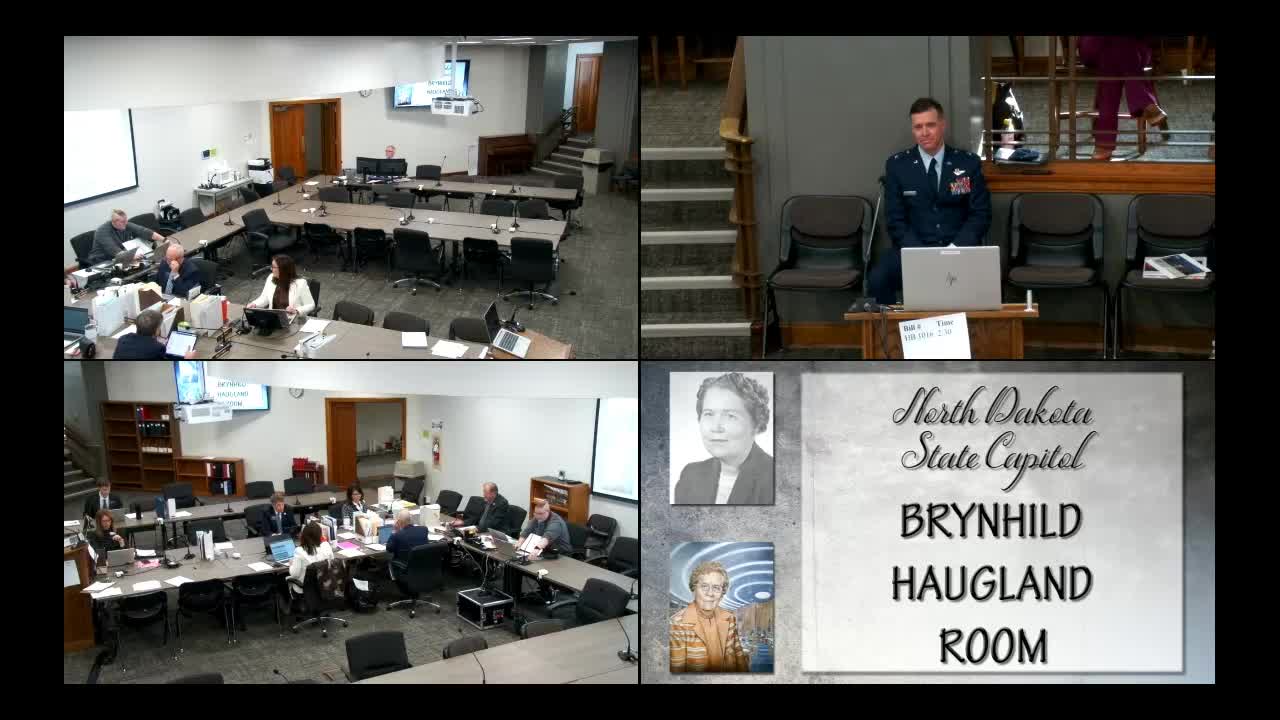House panel hears overview of House Bill 1016, Adjutant General budget; requests for infrastructure, insurance, training presented
Get AI-powered insights, summaries, and transcripts
Subscribe
Summary
Lawmakers heard the Adjutant General and staff review House Bill 1016, outlining requests including $6 million for facility maintenance state match, $790,000 to raise insurance coverage, federal authority requests for Camp Grafton construction, and several staffing and design requests; no vote was taken.
Chairman Munson convened the Government Operations section of the House Appropriations Committee to consider House Bill 1016, the budget request for the Adjutant General’s office. The Adjutant General, Mitch Johnson, presented the department’s biennial priorities and answered lawmakers’ questions.
The request centers on readiness and infrastructure. Johnson described the National Guard and Department of Emergency Services as a force multiplied by federal funding—roughly a 1-to-4 state-to-federal match—and said the current request focuses on deferred maintenance, insurance coverage, facility design and select new full‑time positions.
Johnson’s top requests included a $6,000,000 package to address critical infrastructure and deferred maintenance across armories and readiness centers. The proposal calls for $1.5 million in ongoing general funds and $4.5 million one‑time State Infrastructure Funds (SIF) to catch up on repairs such as roofs and parking lots. Johnson said that state funding can be leveraged for federal matching programs, and estimated the request could generate roughly $24 million in federal match over the period discussed.
The adjutant general also asked for $790,000 in general funds to increase insurance to closer to replacement cost after a state study showed many facilities are underinsured; he said some buildings were insured at roughly one‑third of replacement value. The department described the North Dakota Insurance Reserve Fund (DIRF) analysis as the source for the replacement-cost estimates.
Other requests described to the committee included: federal authority to pursue a roughly $34,000,000 construction project for billeting at the Camp Grafton Regional Training Institute (no state match requested for that federal construction authority); $2,500,000 in design funds for a proposed Williston armory; and a set of full‑time equivalent (FTE) adjustments and additions across Dickinson, Camp Grafton and the State Veterans Cemetery (administrative and facility positions). The department also asked to repurpose an existing federal‑funded FTE to serve as a construction coordinator.
Johnson told lawmakers the Guard’s statewide footprint includes 14 locations and about 4,100 personnel serving in the state force, with 111 members on Title 10 federal orders overseas at the time of the hearing. He said readiness and facility quality help sustain unit strength and community ties.
Committee members questioned matching assumptions, timing of federal awards and the effect of a new federal administration on available federal matching funds. Johnson said the federal match historically has been reliable and that the department expects to compete for federal funding but acknowledged some uncertainty inherent in federal appropriations cycles.
The hearing closed without a committee vote; staff and presenters were asked to return with follow‑up details at a later hearing.
